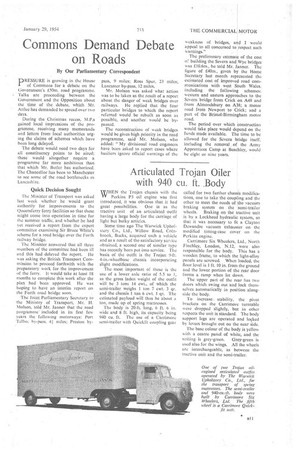Commons Demand Debate on Roads
Page 37

If you've noticed an error in this article please click here to report it so we can fix it.
By Our Parliamentary Correspondent DRESSURE is growing in the House
of Commons for a debate on the Government's f50m. road programme. Talks are proceeding between the Government and the Opposition about the time of the debate, which Mr. Attlee has demanded be spread over two days.
During the Christmas recess, M.P.s gained local impressions of the programme, receiving many memoranda and letters from local authorities urging the claims of schemes which have been long delayed.
The debate would need two days for all constituency points to be aired: these would altogether require a programme far more ambitious than that which Mr. Butler has 'authorized. The Chancellor has been to Manchester to see some of the road bottlenecks in Lancashire. Quick Decision Sought
The Minister of Transport was asked last week whether he would grant authority for improvements to the Queensferry ferry facilities so that these might come into operation in time for the summer traffic, and whether he had yet received a report from the expert committee examining Sir Bruce White's scheme for a road bridge over the Forth railway bridge.
The Minister answered that all three members of the committee had been ill and this had delayed the report. He was asking the British Transport Commission to proceed forthwith with the preparatory work for the improvement of the ferry, It would take at least 18 months to complete this work after the plan had been approved. He was hoping to have an interim report on the Forth road bridge soon. The Joint Parliamentary Secretary to the Ministry of Transport, Mr. H. Molson. told Mr. Janner that the road programme' included in its first few years the following motorways: Port Talho. by-pass. 4.} miles; Preston by pass, 9 miles; Ross Spur, 23 miles; Lancaster by-pass, 12 miles, Mr. Molson was asked what action was to be laken as the result of a report about the danger of weak bridges over railways. He replied that the four particular bridges to which the report referred would be rebuilt as soon as possible, and another would be by
passed. . . The reconstruction of weak bridges would be given high priority in the road programme, said Mr. Molson, who added: " My divisional road engineers have been asked to report cases where hauliers ignore official warnings of the
weakness of bridges, and I would appeal to all concerned to respect such Warnings."
The preliminary estimate of the cost o building the Severn and Wye bridges was f10.6m., he told Mr. Janncr. The figure of £40m., given by the Home Secretary last month represented the estimated cost of improved road communications with west South Wales, including the following schemes: western and eastern approaches to the Severn bridge from Crick on A48 and from Almondsbury on M8; a motor road from Newport to Crick; and a part of the Bristol-Birmingham motor road.
The period over which construction would take place would depend on the funds made available. The time to be allowed for the Severn bridge itself, including the removal of the Army Apprentices Camp at Beachley, would be eight or nine years.












































































